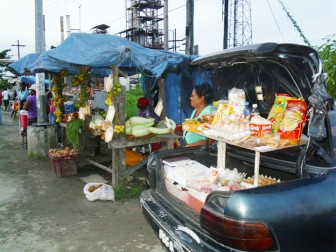The advent and steady growth of the Diamond New Housing Scheme on the East Bank Demerara has spawned a handful of thriving small businesses that cater mostly to the needs of commuters wending their way home.
Every day, vendors plying their trade from the trunks of assorted motor vehicles, offer fresh fruit, vegetables, chicken, eggs, sausages, bread and other consumer goods to residents near the Diamond Car Park area close to the entrance to the housing scheme. Other makeshift stalls fashioned from odd bits of wood and zinc boast well-stocked shelves. Of late, the longer-serving vendors have been joined by newcomers offering cheap clothing, television antenna and assorted bric-a-brac.

The new market is an example of the kind of opportunistic commercial pursuit that could blossom in the wake of the current accelerated housing programme. Though it presents possible congestion challenges, the phenomenon offers an opportunity to the enterprising to become part of the age-old tradition of coastal vending.
Some of the Diamond New Scheme vendors have been plying their trade at the very location for almost a decade. The makeshift market, however, has grown with the advent of the new housing settlement and the available evidence suggests that it has the support of the community.
A female vendor, who declined to give her name, told Stabroek Business that she has been selling at the location for about eight years. Her patrons are mostly persons using the car park so that on the various locations that the park has been relocated, she has simply moved her stall. In the main she offers eggs, chicken and sausages, the ingredients for “quick dinners” in which, she says, her customers are interested. The competition among the vendors is keen but she has survived, even grown. The money that she makes represents the major part of her family income.
Nor are the vendors unaware of the nature of the market which they serve. Most of their customers commute from workplaces in Georgetown to their homes in Diamond so that patronage depends on persuading them to save themselves the trouble of shopping in the city. That means prices must be competitive.
Roderick Robertson and his wife offer ground provisions, fruits, vegetables, seasoning and corn every day. The Robertsons acquire their goods from the various farmers’ markets. It is a daily routine and they are boisterous about the freshness of what they offer. The Robertsons are among the new kids on the Diamond block. They have been selling there for just over a year and they concede that business is good. Their own operation is growing; when they begun they were offering modest quantities of a few kinds of fruit. Apart from the variety of ground provisions they now offer the Robertsons are now among the major fruit vendors to customers.
They concede that business is “good,” but are quick to add that it is not without its challenges. Not surprisingly, there have been interludes of tension between the Local Authority and what is, in fact, an unregulated market. Several attempts have been made to relocate the vendors from the car park area to a tarmac inside the housing scheme. The tarmac is situated a considerable distance from the public road and would deny the vendors access to the large number of customers all of whom must use the entrance to the housing scheme every day.
“The reason we make money here is because it convenient for commuters to get out of the bus, buy from us and then jump in a car to go home. If we move to the tarmac which is located on the Golden Grove side of the scheme then buying from us will no longer be convenient for customers,” Robertson says. He and the other vendors have remained where they are on account of their persistence.
Tough times may yet lie ahead for these intrepid entrepreneurs. They have already been put on notice that their ‘market’ will have to make way for a new four-lane East Bank Demerara highway once it reaches Diamond. With no suitable alternative marketplace on the cards, at least in the short term, there is an air of uncertainty hovering above the vendors’ future. “What we do can disappear just as easily as it appeared,” Robertson admitted.
The experience of the Diamond vendors may well serve the planners of Guyana’s expanded housing drive in good stead. New residential communities will require new ancillary facilities including areas for recreation and play, shops and stores and certainly markets. Where such facilities are not catered for through the creation of adequate spaces, ordinary Guyanese like the Diamond vendors, keen to take advantages of the opportunities that will be created through the creation of new communities will continue to take their chances and will, in all likelihood, continue to run afoul of the authorities. That will do no good either for the new communities or for the bourgeoning entrepreneurial culture that follows those communities.




